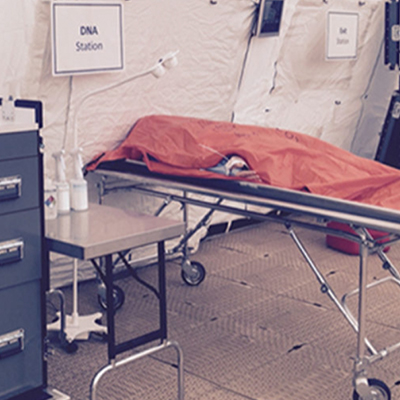A mobile morgue unit is simply a morgue that can be quickly deployed and set up in place of an official morgue facility. They are used when the influx of decedents is so great that regular morgue facilities are filled to capacity. A mobile morgue unit is fully equipped to perform all the necessary functions of any morgue system, including autopsies and various forms of data collection on human remains to help medical examiners determine the identity and/or cause of death. So, what are the capabilities of a mobile morgue unit and how can they help prepare for disaster?
As part of an emergency response plan, mobile morgue units, sometimes called disaster portable morgue units (DPMU), can be expanded with refrigerated trailers of varying sizes, depending on the size of the local population. Refrigerated trailers range from smaller trailers capable of holding about sixteen sets of remains to full-size, fifty-three-foot trailers that can house up to ninety sets of remains. If trailers are not feasible or available, a mortuary enhanced remains cooling system (MERC) can be employed to convert any large space into a refrigeration area for human remains.
The Role of Mobile Morgue Units in Natural Disasters and Emergency Management
In certain areas of the world, where natural disasters such as floods or earthquakes are common, any natural disaster can become a mass fatality incident (especially in developing countries). In such events, power and water may be limited and the death count can instantly overwhelm a jurisdiction’s ability to cope.
Hurricanes, for example, can not only cause power outages and property damage but also cause storm surges that flood and paralyze large areas for weeks, or in some cases, months. The same is true with earthquakes: Haiti spent years recovering from the catastrophic 2010 earthquake when another struck in the summer of 2021. A mass fatality response should include mobile morgue units as part of a comprehensive fatality management plan. In the case when a disaster hits a developing country, mobile morgue and refrigerated units should be part of a first-world disaster response.
Mobile Morgue Units and Mass Casualty Events
Mass shootings and terrorist attacks may have declined in America due to the COVID-19 pandemic, but they can still occur at any time and in any place. Due to the chaotic nature of the scene following one of these events, proper organization is essential. A mass shooting or terrorist attack might create a crime scene that covers a vast area, and that entire area needs to be thoroughly investigated by the authorities. The federal government may send agents to get involved, which could cause even more delay in investigation.
This means that victims may need to be stored and examined on-site rather than being transported to a local morgue facility. They can be examined side-by-side with the crime scene itself for the convenience of local, state, and federal investigators.
Mobile Morgue Units and Transportation Accidents
Transportation accidents are another instantaneous strain on a local healthcare system’s ability to cope with a surge in victims. Transportation accidents can also leave a large crime scene, sometimes measurable in square miles. They also may require cooperation between all levels of government, from local all the way up to federal. Cleanup can take weeks and months, and identifying the dead may be a long, laborious process if the bodies are in a poor state. The deceased may also require decontamination because of chemical, biological, or radiological material. To make matters worse, a transportation accident may be caused by or be a component of a terrorist attack, further compounding the investigation.
This is why a mobile morgue unit is essential for a transportation disaster. Without a portable morgue trailer, the deceased may have to be transported to multiple morgue facilities in different towns or jurisdictions to avoid overwhelming any single one. This can lead to confusion over the identities and the number of victims, causing distress among family members as they attempt to claim their loved ones’ remains. However, with a morgue unit at the site of the accident, bodies can be attended to without having to be transported elsewhere.
Mobile Morgue Units in the Coronavirus Pandemic
Early on in the 2020 Pandemic, cities, morgues, and funeral homes in America were finding themselves unable to handle the sheer amount of bodies from COVID-19 deaths. Large cities like New York and Los Angeles eventually obtained refrigerated trucks normally used to deliver food to restaurants.
Smaller towns and rural communities thought they might escape the worst of the pandemic, but eventually, the number of COVID patients began to rise in every state. Some communities, seeing what was happening in urban areas, were able to get ahead of the surge and equip themselves with mobile morgue units before the number of deaths overwhelmed their local capacity to store human remains. Many of these communities found that mobile morgue units were a critical addition to their overall pandemic response. Some have used their mobile morgue units more than once as the second and third waves of the pandemic arrived.
Get Your City, Town, or Healthcare District Prepared
Having proper resources in place is the key to preparation, and preparedness is key when you never know what could happen next. We’ve learned that nowhere is truly safe from disasters, and preparedness enables a proper disaster response, which sets the tone for eventual recovery and rebuilding. A stunted, haphazard response can unnecessarily push back disaster recovery for years. The capabilities of a mobile morgue unit allow it to play a crucial role in the entire plan.
To ensure that your community is as prepared as it can be, contact Penn Care and learn about all of the tools for emergency preparedness. We’re ready to get you ready!



